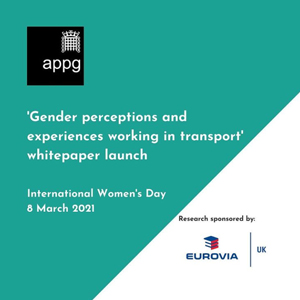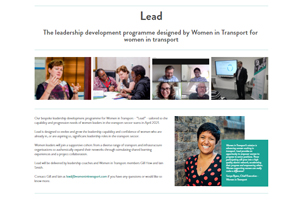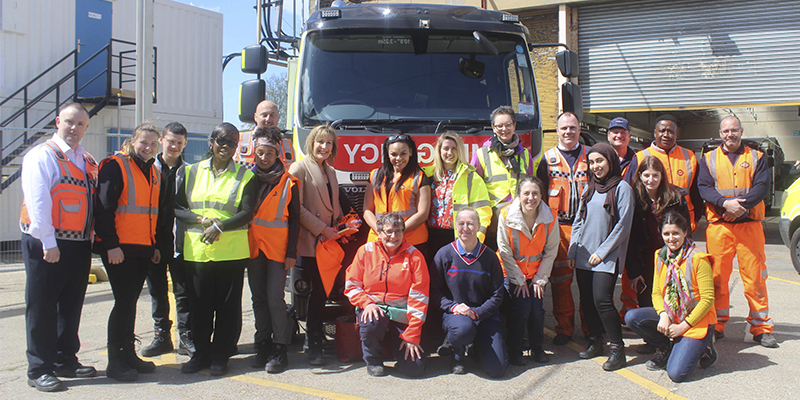Katie Hulland is the president of Women in Transport and associate director at Turner & Townsend, with over 18 years’ experience in the transportation sector with organisations such as Heathrow, HS2, Network Rail and Tube Lines. Katie started her career with the Tube Lines station maintenance team and progressed to be an internal business improvement manager for Network Rail, developing and implementing Six Sigma, as well as lean process improvement projects. Since joining Turner & Townsend Katie has bought together with her business improvement and construction management skills to spilt her time between the operational side of the business and client-facing roles.

“Over two-thirds of women we surveyed felt the transport industry has a macho culture, and 70% said they had experienced discriminatory behaviour or language targeted against them.”
18 years in the transport sector
I am an associate director with Turner & Townsend’s programme advisory function and the company UK key client lead for Network Rail. I have over 18 years’ experience in the transportation sector with organisations such as Mace, Heathrow, HS2, Network Rail and Tube Lines. I have delivered a range of projects starting my career with the Tube Lines station maintenance team, progressing to business change management for Network Rail, developing and implementing Six Sigma and Lean projects. I then spent five years on the coal face of delivery, enhancing and renewing tube stations.
I now work joining together my different experiences providing strategic advisory support to transport clients internationally.

I am also currently president of Women in Transport, where I make up half of the leadership team alongside Sonya Byers, our chief executive. Supported by our board members and volunteers, we steer the organisation to ensure it best serves the professional development of our members, empowering them to maximise their potential. I often have the privilege of representing the organisation at external events, ensuring our ambitions and the voices of our members are heard widely.
Pivoting our offer in response to the pandemic
The COVID-19 pandemic meant we had to adapt our varied in-person events programme and move it completely online so we could continue supporting the career advancement of our members. We have been able to host almost a full range of events, including virtual skills development workshops, networking webinars, and even an online book club.
We have also provided online wellbeing sessions to support the mental health of our members throughout the pandemic.
Thankfully, our continued expansion has sustained the organisation through the external challenges of the past year. We have welcomed many new members, retained the support of our corporate sponsors, and have just launched a Scotland hub to expand our membership to those working north of the border.
Barriers faced by women in transport
Our recent study into the experiences and perceptions of 567 people working in transport has highlighted the challenges facing women in the sector.

The research also highlights the barriers to career progression faced by women. Over a third of the women in our study felt it was difficult to progress their careers in transport. Fewer men reported these difficulties.
Indeed, three-quarters of women agreed that it is easier for men to progress than women. In their written comments, many female respondents connected these barriers to the prevailing macho culture, mirroring what we have heard anecdotally from our members.
This sheds light on why the gender pay gap exists in the industry. To challenge the gender pay gap, we must dismantle those barriers to career progression. This should be part of a concerted effort by the government and industry to reform the culture of the transport workplace.
One strong positive that the research highlighted was that despite their somewhat negative experiences, most women surveyed were overwhelmingly proud to work in the transport sector (83%), and 85% were likely to recommend a transport career to other women.
Working with like-minded parliamentarians and industry leaders to make positive change
Women in Transport act as the secretariat for the All-Party Parliamentary Group (APPG) for Women in Transport, a cross-party group of MPs and peers committed to tackling the underrepresentation of women in transport.
The APPG provides a forum for us to work with like-minded parliamentarians to discuss and overcome barriers to representation and promote best practice in gender diversifying the workforce.
We launched our recent research paper at an APPG event, attended virtually by over 130 parliamentarians and industry leaders. Events like these enable us to share our work and ambitions around Westminster and beyond.
Advice on how to reduce the gender pay gap
There are many ways transport employers can look to reduce their gender pay gaps, particularly by combatting the barriers to progression faced by women.
Gender-inclusive recruitment and retainment practices should be used at all levels. Elements of which could include inclusive job descriptions and removing personal details from CVs, as well as establishing diverse interview panels. We also recommend employers start reverse mentoring programmes to pair male senior leaders with women in more junior roles. This would help create a fair and inclusive company culture that learns from women’s experiences.
Organisations might also consider investing in the personal development of key members of female staff to unlock their potential and enable them to progress in the industry.
Introducing Lead
As a result of our recent research, we have just launched Lead. This bespoke leadership programme is designed to evolve and grow the leadership capability and confidence of women who are already in, or are aspiring to, significant leadership roles in the transport sector.

As well as being accessible to individuals, Lead also provides an opportunity for businesses to address the underrepresentation of women at senior levels by sponsoring key staff through the programme. In return, women will emerge from the course as confident, motivated, and capable leaders, adding value to their organisation and becoming role models to attract more female talent.
While widespread changes are needed, we are confident that schemes like Lead can help women overcome some of the barriers to career progression that they face. This will contribute, in the short and long-term, to the closing of the pay gap.
https://www.linkedin.com/in/katie-hulland-9076058
https://www.womenintransport.com/





